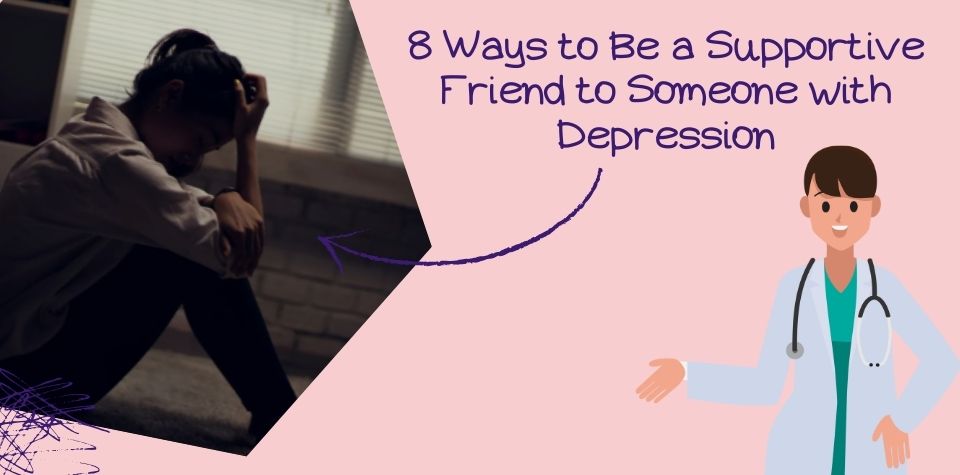Watching your friend live with depression can be tough. Here are 8 ways you can be a supportive friend to someone healing from depression.
Supporting someone with depression can seem overwhelming at first. You see the signs within them and feel hopeless. The urge to somehow make it all better for them is stronger than ever.
Mental Health America suggest that depression is a major health condition in the United States. According to MHA, this psychological health condition impacts about 8% of adults each year.
Although depression is not something one can heal from in a day, there are ways you can support someone going through it. You’re already being a great friend if you’re here reading this blog and searching about it.
Before everything, remember that each person is different and may experience depression differently. This blog is a rough guide, but asking your friend what they need and what their therapist says will always remain a priority.
Now, let’s review the 8 steps to being a supportive friend to someone with depression.
Ways to Help People with Depression
1. Learn about depression
Unless you have gone through depression yourself, you’ll never really know what it is. It’s different from the sadness you feel sometimes and can vary from person to person. Which is why educating yourself about it is the first step.
Search for the symptoms, diagnostics, treatments, and reasons why they can happen. Many times, there is no particular reason for depression. Learning about it can help you not make any assumptions and say the wrong thing to your friend. This way, you can understand better what they feel and what you can do to comfort them.
2. Initiate a conversation
People living with depression often find it hard to start a conversation about it. They might feel guilty pulling you into what they’re dealing with.
You can start a conversation with them and let them know they can rely on you. Assure them that you’re here if they want to talk. You can say things like- ‘It looks like you’re having a rough time lately. What’s on your mind?’
It’s better to ask open-ended questions and listen actively. Give them space to talk about their feelings, and don’t make them feel judged. But remember to never force them into speaking.
3. Help them find support
There can be many reasons why your friend hasn’t looked for support anywhere. They might feel intimidated by the idea of therapy, feel judged by societal views, or might not even be aware they’re dealing with depression.
If your friend shows signs that they want to speak to a therapist, but something is holding them back, it’s important to talk about it. Let them know there’s nothing wrong with depression and getting help. You can help them find trustworthy therapists and encourage them throughout their counseling journey.
4. Keep in touch
Isolating your friend and letting them deal with it on their own is not the way to go. Keep in touch to let them know you care about them.
Talk to them whenever they can, visit them often, and keep them in the loop with everything that’s happening. Often, people living with depression start to withdraw themselves from their social circle. It’s necessary to remind them how much you value their friendship.
Even a quick text like, ‘This reminded me of you. I hope you’re taking care of yourself.’ can put a little smile on their face.
5. Don’t try to decode their depression
Depression is a sensitive topic and should be taken seriously. It can also be quite complicated and manifest itself differently in every person. Each person’s depression can be influenced by their personal history, biology, environment, and other factors.
Trying to assume their feelings or attempting to explain their depression to someone else can be invasive. It’s important to stay empathetic and respectful, even when you can’t fully comprehend what they are going through.
6. Offer help with everyday things
Living with depression can often make everyday tasks seem big. You might find your friend with piled-up laundry, an empty fridge, unpaid bills, and dirty dishes.
You can lighten their load by offering them help with all these mundane tasks. They might feel hesitant at first, but it’s always a good thing to insist on it.
To avoid putting a burden on them, try to be more specific in offering help. Say things like, ‘I was preparing a meal you love. Would you like me to drop it off at yours?’
7- Act normal around them
When you’re constantly too cautious around someone with depression, they might start feeling like a burden.
Acting normally around them can give them a sense of normalcy and stability, ensuring that not much has changed. It helps them realize that their condition doesn’t make people around them uncomfortable. It can also encourage them to think that you value them as a whole person and don’t define them by their depression.
8. Try to be patient
Healing from depression can be a slow process. It might take months or even years to completely let go of it. A good day for someone with depression doesn’t mean they’re ‘cured’. It can feel too much at times, but avoid asking them to ‘just snap out of it’.
Also, don’t forget to take care of yourself and take care of them. Set your boundaries, and don’t feel guilty when you can’t always be there for them.
Conclusion
Supporting someone living with depression will always be tough. You will make mistakes, say the wrong things, make things awkward, and even annoy them further. But it’s the thought behind supporting them that counts.
Always try to empathize with them and take breaks when you feel it affecting your own mental health. Keep looking for ways to comfort them and make them feel that their feelings are valid.
Observe any warning signs that can indicate if their condition is worsening. Their struggle with depression is a journey with lots of ups and downs. The constant presence of a loved one assures them that they have someone who has got their back.











